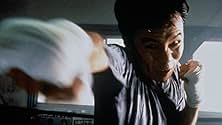PUNTUACIÓN EN IMDb
7,0/10
4,2 mil
TU PUNTUACIÓN
Añade un argumento en tu idiomaSuspecting that his childhood friend, a professional boxer, is having a love affair with his fiancée, a businessman starts training rigorously in order to take him down.Suspecting that his childhood friend, a professional boxer, is having a love affair with his fiancée, a businessman starts training rigorously in order to take him down.Suspecting that his childhood friend, a professional boxer, is having a love affair with his fiancée, a businessman starts training rigorously in order to take him down.
- Premios
- 2 premios y 2 nominaciones en total
Argumento
¿Sabías que...?
- ConexionesFeatures Metrópolis (1927)
Reseña destacada
This is not a movie you experience with the brain, rather it's an assault on the senses. Some of my favourite cinema does that, and I'm always on the lookout for movies that call us to live through a certain experience, to vicariously sense the world as another person might. The ultimate joy is for me to be able to take out something that matters, an otherwise impossible view of the world in my livingroom that makes sense.
The problem of Tokyo Fist is that it's packed with so much rage and annihilation yet aims it nowhere. The boxer characters are punching, but they're not punching outwards, at society, nor inwards at the soul, they're simply pummeling and being pummeled senseless. Senseless is an apt word here, for in Tokyo Fist the mind doesn't matter, and the human body is something to be destroyed, the senses torn from it and thrown in a bloody heap on a grimy floor. Tsukamoto can be seen beating his head in a bloody pulp against a wall, but that wall signifies nothing. The spurts of blood gushing from broken noses and deformed bonecheeks, the film celebrates with the comic verve of Sam Raimi.
With time Tsukamoto would grow out of the techno angst of this period, but enabling the maturity of films like Vital, a certain youthful vitality had to be sacrificed in the process. I lament this because few directors dare make films like his, even Tsukamoto himself doesn't seem able to make them anymore.
Fits of jealousy, miserable love triangles, personality changes, all these are trifle story points. What I take from Tokyo Fist is the aimlessness of violence, taken to the extreme because there's nothing to absorb it. Likely Tsukamoto grew up in a Japanese society of the 80's and 90's, like the rest of the world, stifled in the mire of apathy and complacency. People had the money to buy and the selection to buy from, but not the struggle with grand ideals. The resulting New Wave of his cinema is a New Wave of disillusionment turned against itself, a shell without a solid core to make it dream a better society.
In this light, it makes sense to see Tsukamoto playing a young employee, fresh out of high school and already into a suit and a tie running errands for a faceless corporation, turning into a crazed animal for whom even love is a petulant obsession, another passing need to be consummated.
The problem of Tokyo Fist is that it's packed with so much rage and annihilation yet aims it nowhere. The boxer characters are punching, but they're not punching outwards, at society, nor inwards at the soul, they're simply pummeling and being pummeled senseless. Senseless is an apt word here, for in Tokyo Fist the mind doesn't matter, and the human body is something to be destroyed, the senses torn from it and thrown in a bloody heap on a grimy floor. Tsukamoto can be seen beating his head in a bloody pulp against a wall, but that wall signifies nothing. The spurts of blood gushing from broken noses and deformed bonecheeks, the film celebrates with the comic verve of Sam Raimi.
With time Tsukamoto would grow out of the techno angst of this period, but enabling the maturity of films like Vital, a certain youthful vitality had to be sacrificed in the process. I lament this because few directors dare make films like his, even Tsukamoto himself doesn't seem able to make them anymore.
Fits of jealousy, miserable love triangles, personality changes, all these are trifle story points. What I take from Tokyo Fist is the aimlessness of violence, taken to the extreme because there's nothing to absorb it. Likely Tsukamoto grew up in a Japanese society of the 80's and 90's, like the rest of the world, stifled in the mire of apathy and complacency. People had the money to buy and the selection to buy from, but not the struggle with grand ideals. The resulting New Wave of his cinema is a New Wave of disillusionment turned against itself, a shell without a solid core to make it dream a better society.
In this light, it makes sense to see Tsukamoto playing a young employee, fresh out of high school and already into a suit and a tie running errands for a faceless corporation, turning into a crazed animal for whom even love is a petulant obsession, another passing need to be consummated.
- chaos-rampant
- 23 mar 2011
- Enlace permanente
Selecciones populares
Inicia sesión para calificar y añadir a tu lista para recibir recomendaciones personalizadas
- How long is Tokyo Fist?Con tecnología de Alexa
Detalles
Contribuir a esta página
Sugerir un cambio o añadir el contenido que falta

Principal laguna de datos
By what name was Tokyo Fist (1995) officially released in Canada in English?
Responde























